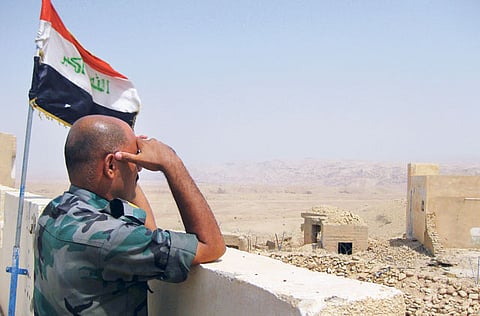Beefed up presence on blurred border
Iran and Iraq build fortified posts as tensions escalate amid Iraq government limbo

Qutaiba Border Fort, Iraq : On any map, this castle-like fort is located in Iran. But war, time and drifting desert sands have blurred the border, and for now, Iraqi guards stoutly defend Qutaiba as theirs.
The guards are part of a beefed-up presence on both sides of a long, porous and ill-defined border. Iraq is building four new border forts in its eastern Wasit province alone, which abuts Iran for 186 kilometres.
Iran also is adding forts, evidenced by half-built structures surrounded by scaffolding that can be seen from Iraq.
The increased tension is a result of an Iraqi government in limbo as American troops prepare to leave the country after more than eight years of war. Underscoring the insecure time, Iraqi wariness of Iranian aggression is on the rise, especially after two major Iranian incursions in less than a year.
"The region here is like a jungle: the strong eat the weak," said Iraqi Brigadier General Sami Wahab, who oversees the nearby Zurbatiyah port of entry, the largest official pedestrian land crossing between Iraq and Iran.
"If the Iraqi government keeps going backward and reaches the level where you can say it's a weak country, then there's a good chance of Iran coming in," Sami said. "But we don't have cannons to respond" we don't have jets to bomb. That's why the Iraqi people are scared."
Kurdish rebels
On Sunday, Iranian General Abdolrasoul Mahmoudabadi said the Revolutionary Guards had pushed into Iraq over the weekend and killed at least 30 members of an armed group involved in an attack last week that Iran had blamed on Kurdish rebels.
It was a rare example of Iran openly admitting to a cross-border incursion into Iraq.
The US for its part calls Iran a serious threat — one that is boosting efforts to fund, train, supply and shelter insurgents as the US-led war that began in 2003 winds down. A senior intelligence official in Washington, who spoke anonymously because he was not authorised to talk about the sensitive issue, expressed concern that Iran will supply anyone, terror group or common criminal, with bomb-making parts or other weapons to create the image of instability in Iraq.
A political analyst at Tehran's Azad University said that under Saddam Hussain, Iraq portrayed itself as leader of the Arab world, leading to tension with Iran. But if Iraq's government remains weak, Iran will not go on the offensive, he said.
"Iran already has a big amount of influence in Iraq so it does not need any offensive measures in the borders," analyst Ahmad Bakhshayesh said in an interview.
Sign up for the Daily Briefing
Get the latest news and updates straight to your inbox


